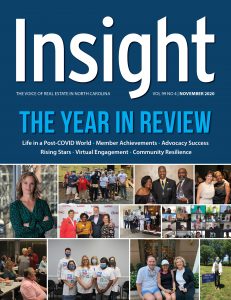Life in a Post-Covid World
 BY MARK ZIMMERMAN, SENIOR VICE PRESIDENT OF EXTERNAL AFFAIRS
BY MARK ZIMMERMAN, SENIOR VICE PRESIDENT OF EXTERNAL AFFAIRS
Greeting someone with a handshake, a hug or a pat on the back. Taking the family to a movie theater or going out to see a show or a concert. Getting together with your fellow REALTORS® at a convention or other event.
Will we ever see this again? Yes, we will. A lot has to happen before we get fully beyond the pandemic, but it will come. However, the world, and our world, will be different.
Now that we’ve lived in this altered state for most of the year, it’s appropriate to start looking at how COVID will change how we work, how you work and how our industry will be impacted long term.
While no one has a crystal ball, we’ve already seen how adapting to a virtual, remote environment has given us new tools to engage with others. Since we’re all in the relationship business, having more ways to involve more people is a good thing.
As an example, while we certainly will continue to have in-person meetings in Raleigh with our Legislators (we want the visual impact of “taking over” the halls of the General Assembly), the Zoom Town Halls we had with many of our elected officials this spring allowed many more of you to participate in the process. Moving forward, we will want to utilize both opportunities to remind legislators why REALTORS® and real estate are so important to their constituents and the economy of their districts.
Likewise, NC REALTORS® in general, and your government affairs committee specifically, had to increase our communications with you to address issues we have all faced due to COVID. Webinars, emails, newsletters, website pages have all multiplied. That has allowed us the opportunity to ensure you are fully informed about what we’re working on and how you can help us accomplish our collective goals. Expect more of that down the road.
COVID is also going to accelerate North Carolina’s growth, both in population and economic development. North Carolina was already one of the fastest-growing states in the nation; expect that to increase. There is an exodus from some very hard-hit areas, particularly on the West Coast and in the Northeast. Many of those people will be moving their families and their businesses to this great state we call home. The real estate market will continue to reap the rewards from that influx of new North Carolinians.
There will be shifts in the real estate market inside the state, too. After being forced to have their employees work from home, many companies are now considering making remote work permanent. That will allow people to work in areas further from their offices.
We shouldn’t expect to see the flight from urban areas that New York and San Francisco are experiencing. Our cities aren’t that dense and don’t have many of the issues major metropolitan areas have. However, don’t be surprised when our beautiful, affordable rural areas attract more residents. Many of these areas were seeing population declines. Some of that will be reversed.
Of course, that trend will intensify the need to address infrastructure needs in rural North Carolina, most notably broadband access. If you can’t connect, you cannot work remotely. So, your Legislative Committee and government affairs staff is already increasing our emphasis on lobbying for increased broadband access. Progress has been made recently on the resources needed for this.
Another change related to work-from-home you might see is new homes will likely be larger. There will need to be a dedicated work-space away from the chaos of home life. Square footage has been decreasing lately; expect it to inch up to accommodate new needs.
Of course, with these benefits come costs. Literally—in this case. More people means more demand, which means our lack of supply will result in further housing affordability issues.
To address that, you’ll be hearing a lot more from your government affairs staff about making it easier to increase the housing supply. We need fewer regulations, a less onerous approval process and lower fees to be able to house our growing population.
Finally, commercial real estate is already seeing some big changes. The pressures on the retail sector have just magnified. Office space needs to be re-thought. On the other hand, if we do get business relocations, industrial and flex sectors should benefit.
COVID has undoubtedly changed our lives in 2020. But after it goes away, many of those changes will be here to stay. The good news is at the center of many of those changes are REALTORS® who play such a pivotal role in transactions and transitions. We in government affairs have a central role to play as well. We need to ensure the government is ameliorating problems, taking advantage of new markets, and not over-regulating the shifts that are underway.

